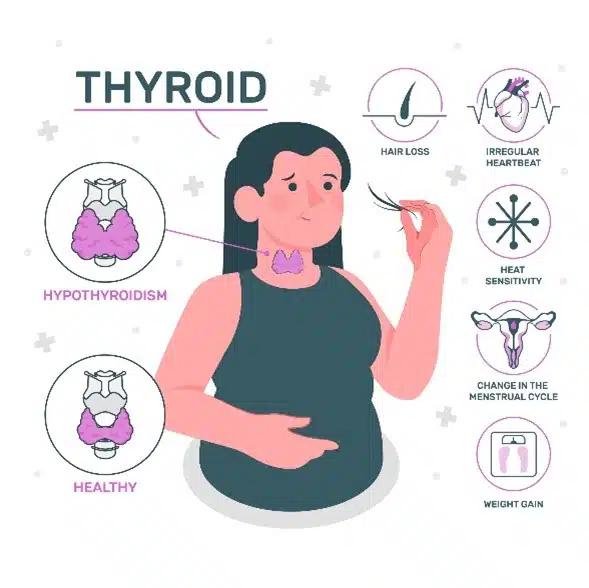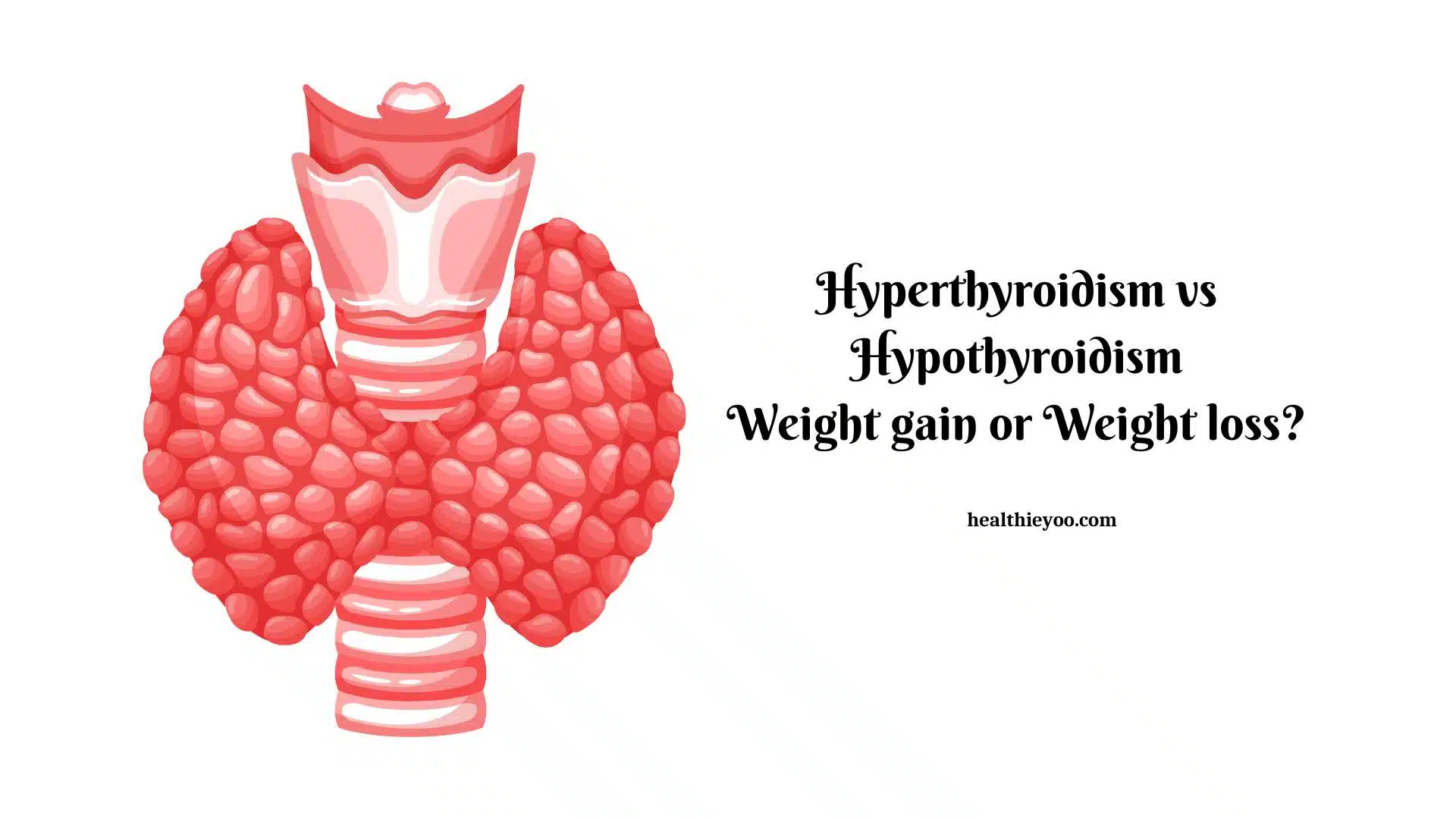Maintaining a healthy weight is a goal that many individuals strive to achieve. However, several factors can influence weight management, including the health of the thyroid gland. The thyroid, a butterfly-shaped gland in the neck, orchestrates critical hormonal functions that significantly impact metabolism, body weight regulation, and overall well-being. In this comprehensive exploration, we delve into the profound connection between thyroid function and weight management, examining not only the physiological interplay but also expanding on holistic strategies for optimal health.
Understanding the thyroid gland
To comprehend the thyroid’s influence on weight management, it’s imperative to familiarize ourselves with the gland’s function. The thyroid gland, located in the neck, produces hormones that control numerous bodily functions, including cellular metabolism, temperature regulation, and energy expenditure. These hormones, known as thyroid hormones, mainly consist of thyroxine (T4) and triiodothyronine (T3). Together, they regulate the rate at which our cells utilize energy.
Recent research has highlighted the role of T3 in gene expression and protein synthesis, elucidating its direct influence on metabolic rate regulation beyond traditional viewpoints.
Gut Health Connection withThyroid Health
Cutting-edge studies emphasize the crucial interplay between gut health and thyroid function, unveiling the significance of the gut microbiome in modulating thyroid hormone conversion and absorption. This connection sheds light on the potential influence of probiotics and prebiotics in supporting thyroid health, offering a promising avenue for future research and holistic management approaches.
The intricate link between gut health and thyroid function has garnered increasing attention in recent scientific research, shedding light on the profound impact of the gut microbiome on thyroid hormone balance and overall metabolic health.
The gut microbiome, comprising trillions of microorganisms residing in the digestive tract, plays a pivotal role in modulating various physiological processes.
Research highlights the role of specific gut bacteria in facilitating this conversion process. For instance, certain bacteria, such as Lactobacillus and Bifidobacterium species, have been associated with promoting the deiodination of T4 to T3, contributing to the maintenance of adequate thyroid hormone levels.
Moreover, the gut barrier, which regulates the passage of substances from the intestines into the bloodstream, influences immune responses and inflammation levels within the body. A compromised gut barrier, often termed “gut permeability (leaky gut),” may trigger autoimmune reactions, potentially contributing to autoimmune thyroid conditions like Hashimoto’s thyroiditis or Graves’ disease.
Studies have demonstrated that gut dysbiosis (an imbalance in the gut microbiota) can instigate inflammatory responses, affecting thyroid function and contributing to the onset or exacerbation of thyroid disorders. Inflammation within the gut can disrupt the intricate communication between the gut and the immune system, potentially leading to an immune attack on the thyroid gland.
Furthermore, the gut microbiome’s ability to metabolize certain nutrients essential for thyroid health, such as iodine and selenium, underscores its crucial role in supporting optimal thyroid function. Dysbiosis or inadequate microbial diversity may impair the absorption and utilization of these key nutrients, potentially impacting thyroid hormone production and conversion.
Understanding this bidirectional relationship between gut health and thyroid function emphasizes the significance of nurturing a balanced and diverse gut microbiome through dietary choices rich in fiber, prebiotics, and probiotics. These dietary components support a flourishing gut microbial community, thereby fostering an environment conducive to optimal thyroid function and metabolic health.
Thyroid Health and Metabolism
Metabolism serves as the cornerstone of weight management. A well-functioning thyroid gland ensures a healthy metabolism, which aids in maintaining an optimal body weight. The thyroid hormones T3 and T4 control the metabolic rate by influencing cellular energy production.
The connection between thyroid health and metabolism is a fundamental aspect of overall wellness and weight management. The thyroid gland’s role in regulating metabolism is pivotal, primarily through the actions of its hormones, triiodothyronine (T3) and thyroxine (T4).
Metabolism, often described as the body’s engine, refers to the complex biochemical processes that occur within cells to maintain life. It encompasses two primary components: anabolism, the process of building molecules and storing energy, and catabolism, the breakdown of molecules to release energy.
Thyroid hormones, specifically T3 and T4, play a crucial role in orchestrating metabolic activity at the cellular level. These hormones act as metabolic regulators by influencing gene expression, protein synthesis, and enzymatic reactions in various tissues throughout the body:
1. Basal Metabolic Rate (BMR)
Thyroid hormones profoundly impact the basal metabolic rate—the amount of energy expended by the body at rest to maintain essential physiological functions. T3, the more biologically active hormone, directly affects the BMR by stimulating the cellular machinery responsible for energy production. Higher levels of T3 generally lead to an increased BMR, resulting in greater energy expenditure even during periods of rest or inactivity.
2. Energy Utilization
T3 and T4 play pivotal roles in how cells utilize nutrients, particularly carbohydrates and fats, for energy production. These hormones enhance the breakdown of glucose and fatty acids, promoting their conversion into usable energy. By modulating cellular respiration and ATP (adenosine triphosphate) production, thyroid hormones contribute significantly to overall energy utilization.
3. Regulation of Body Temperature
Thyroid hormones help regulate body temperature by influencing thermogenesis, the process by which the body generates heat. They facilitate this by modulating the efficiency of cellular energy production, enabling the body to maintain a stable internal temperature.
Disruption in thyroid hormone levels, as seen in conditions like hypothyroidism or hyperthyroidism, can markedly affect metabolic processes. Hypothyroidism, characterized by low thyroid hormone levels, can lead to a decreased BMR, contributing to a sluggish metabolism and potentially resulting in weight gain. Conversely, hyperthyroidism, marked by excessive thyroid hormone production, can accelerate the metabolic rate, leading to unintended weight loss.
The intricate connection between thyroid health and metabolism underscores the thyroid gland’s pivotal role as a metabolic regulator. A well-functioning thyroid ensures the efficient utilization of nutrients, optimal energy production, and maintenance of a healthy body weight. Understanding and supporting thyroid health are crucial elements in fostering a balanced metabolism, contributing to overall wellness, and effective weight management.

Hypothyroidism and Weight Gain
Hypothyroidism, a condition characterized by an underactive thyroid gland, can significantly impact weight management. When the thyroid gland fails to produce sufficient thyroid hormones (particularly thyroxine (T4) and triiodothyronine (T3)), this deficiency significantly affects various metabolic processes. This culminates in alterations that can contribute to weight gain or hinder weight loss efforts.
1. Sluggish Metabolism
One of the hallmark effects of hypothyroidism is a decelerated basal metabolic rate (BMR). Thyroid hormones are pivotal in regulating the rate at which the body utilizes energy. In hypothyroidism, the diminished levels of T3 and T4 lead to reduced cellular metabolism, resulting in a decreased capacity to burn calories even during periods of rest. This sluggish metabolism can make it more challenging for individuals to manage their weight effectively.
1. Sluggish Metabolism
One of the hallmark effects of hypothyroidism is a decelerated basal metabolic rate (BMR). Thyroid hormones are pivotal in regulating the rate at which the body utilizes energy. In hypothyroidism, the diminished levels of T3 and T4 lead to reduced cellular metabolism, resulting in a decreased capacity to burn calories even during periods of rest. This sluggish metabolism can make it more challenging for individuals to manage their weight effectively.
2. Impaired Macronutrient Utilization
Thyroid hormones play a crucial role in the breakdown and utilization of carbohydrates, fats, and proteins for energy production. In hypothyroidism, impaired thyroid function hampers the efficient breakdown of these macronutrients, leading to their accumulation in the body as adipose tissue (fat). This contributes to weight gain, especially in the form of increased fat mass.
3. Altered Digestive Processes
Hypothyroidism can affect the digestive system, leading to symptoms such as constipation, bloating, and a slower transit time through the gastrointestinal tract. This delayed digestion may further impact weight management by affecting nutrient absorption and metabolism. Slower digestion can lead to prolonged feelings of fullness, affecting appetite regulation and potentially contributing to weight gain.
4. Insulin Sensitivity and Lipid Profile
Thyroid hormones influence insulin sensitivity and lipid metabolism. In hypothyroidism, insulin resistance may develop, affecting how cells respond to insulin and leading to higher blood sugar levels. Additionally, altered lipid metabolism may result in increased levels of cholesterol and triglycerides, contributing to weight gain and cardiovascular health concerns.
5. Fluid Retention
Some individuals with hypothyroidism may experience fluid retention, leading to temporary weight fluctuations due to increased water retention in the body tissues. While this doesn’t account for substantial long-term weight gain, it can contribute to feelings of bloating and discomfort.
Managing weight in hypothyroidism often requires a multifaceted approach, including thyroid hormone replacement therapy prescribed by healthcare professionals. Additionally, adopting lifestyle modifications such as a balanced diet, and regular exercise, and addressing underlying factors like insulin resistance or digestive issues can aid in weight management efforts despite the challenges posed by the condition. Consulting healthcare providers for personalized guidance and treatment is crucial for effectively managing weight in individuals with hypothyroidism.
Hyperthyroidism and Weight Loss
Contrary to hypothyroidism, hyperthyroidism is characterized by an overactive thyroid gland that produces an excess of thyroid hormones. This condition can lead to unintended weight loss, as the body’s metabolic rate is abnormally accelerated. Individuals with hyperthyroidism may experience increased appetite, despite the weight loss, due to the revved-up metabolism.
Hyperthyroidism, marked by excessive production of thyroid hormones—triiodothyronine (T3) and thyroxine (T4)—results in a state of heightened metabolic activity. This overstimulation significantly influences various physiological processes, leading to unintended weight loss, despite increased appetite, in individuals affected by this condition.
1. Accelerated Metabolism
Elevated levels of T3 and T4 in hyperthyroidism prompt an increase in the basal metabolic rate (BMR). This accelerated metabolism expedites the body’s energy expenditure, causing a greater utilization of calories even during rest. Consequently, individuals with hyperthyroidism tend to burn more calories, often resulting in unintentional weight loss.
2. Increased Energy Expenditure
The hypermetabolic state associated with excess thyroid hormones leads to heightened energy expenditure. This can manifest as increased heat production (resulting in feelings of heat intolerance and sweating), a rapid heartbeat (palpitations), and restlessness. These symptoms are indicative of the body’s heightened energy usage, contributing to weight loss despite maintained or increased food intake.
3. Muscle Wasting
In hyperthyroidism, the increased metabolic demand can lead to the breakdown of muscle protein. This phenomenon, known as catabolism, results in muscle wasting or muscle breakdown. Despite the weight loss on the scale, a portion of this loss may include lean muscle mass, impacting overall body composition.
4. Gastrointestinal Effects
The hyperactivity induced by excess thyroid hormones can accelerate gastrointestinal motility, leading to an increased frequency of bowel movements or diarrhea. This heightened intestinal activity can impact nutrient absorption and result in a reduced absorption of nutrients, potentially contributing to weight loss.
5. Appetite Changes
Despite the increased appetite experienced by some individuals with hyperthyroidism, the weight loss observed is generally more significant than the increased food intake can account for. This disparity between increased hunger and weight loss underscores the powerful influence of an elevated metabolic rate in driving weight reduction.
Managing weight loss associated with hyperthyroidism involves addressing the underlying thyroid dysfunction through medical intervention. Treatment approaches may include medications to regulate thyroid hormone levels, radioactive iodine therapy, or, in some cases, surgical intervention to address the overactive thyroid gland.
Nutritional support is also essential to ensure that despite increased energy expenditure, individuals with hyperthyroidism receive adequate nutrients to mitigate muscle wasting and support overall health. Collaborating with healthcare providers, including endocrinologists and nutritionists, can support tailored treatment plans and dietary strategies to manage weight loss effectively while addressing the underlying thyroid condition. Regular monitoring and adjustments in treatment protocols are crucial for achieving a balance between thyroid function, metabolic rate, and healthy weight management in individuals with hyperthyroidism.
Thyroid Disorders and Body Composition
Beyond influencing body weight, thyroid health also impacts body composition. Adequate levels of thyroid hormones are essential for preserving lean muscle mass, which in turn contributes to overall metabolic health. Hypothyroidism may be associated with muscle loss and a higher percentage of body fat. On the other hand, hyperthyroidism may lead to muscle wasting, despite weight loss, due to increased muscle protein breakdown.
The Connection Between Thyroid Health and Dietary Patterns
While thyroid health exerts a significant influence on weight management, our dietary choices can also impact the thyroid’s functioning. Certain nutrients play a vital role in supporting optimal thyroid health and metabolism. Incorporating a well-balanced diet rich in iodine (seaweed shellfish, and sea vegetables), selenium (Brazil nuts), zinc (shellfish, legumes, and seeds), vitamin D (fatty fish, fortified dairy), and omega-3 fatty acids (found in fish, flaxseeds, and walnuts) promotes a supportive environment for thyroid hormone production, conversion, and contribute to maintaining optimal thyroid function. Moreover, emphasizing a balanced intake of fiber-rich foods nurtures a healthy gut, positively influencing thyroid health.
Exercise, Thyroid Health, and Weight Management
When it comes to weight management, regular exercise can be beneficial for supporting overall thyroid health. Engaging in aerobic activities, resistance training, or a combination of both, contributes to a healthy metabolism, promotes efficient energy utilization, and supports weight management.
Holistic Approaches
Incorporating stress-management techniques like yoga, meditation, or mindfulness practices is increasingly recognized as beneficial for thyroid health. Chronic stress can disrupt the hypothalamic-pituitary-thyroid axis, impacting hormone levels and contributing to thyroid imbalances. Integrating relaxation methods supports overall well-being and may indirectly aid in managing thyroid-related weight fluctuations.
Furthermore, exploring alternative therapies such as acupuncture or herbal remedies like adaptogenic herbs (e.g., Ashwagandha, Rhodiola) shows promise in supporting thyroid function and addressing associated symptoms, though further research is warranted in these areas.
Conclusion
Achieving and maintaining a healthy body weight relies on various interconnected factors, with the health of the thyroid gland being a significant element. Whether an individual is dealing with hypothyroidism or hyperthyroidism, understanding the relationship between thyroid health and weight management is crucial. Prioritizing thyroid-supportive behaviors such as maintaining a balanced diet, regular exercise, and seeking medical guidance including working with a RHN (Registered Holistic Nutritionist ™) to address any underlying thyroid issues, can contribute to optimal health and weight management. By acknowledging the complex connection between thyroid support and weight loss, individuals can proactively work towards achieving their weight management goals while prioritizing their overall well-being.
Sources
Thyroid hormone metabolism. (n.d.). Retrieved from https://www.thyroid.org
Hypothyroidism & weight loss. (2021, May 28). Retrieved from https://www.thyroid.org
Hyperthyroidism & weight gain. (2020, March 19). Retrieved from https://www.thyroid.org
Roos, A., Bakker, S. J., Links, T. P., & Gans, R. O. (2007). Thyroid function is associated with components of the metabolic syndrome in euthyroid subjects. Journal of Clinical Endocrinology & Metabolism, 92(2), 491-496. ↩
Papi, G., Pearce, E. N., & Braverman, L. E. (2012). Managing hyperthyroidism in pregnancy: current perspectives. International Journal of Women’s Health, 4, 319-328. ↩
Zimmermann, M. B. (2009). Iodine deficiency. Endocrine Reviews, 30(4), 376-408. ↩
Duntas, L. H. (2010). Selenium and the thyroid: a close-knit connection. Journal of Clinical Endocrinology & Metabolism, 95(12), 5180-5188. ↩
Lynch SV. Gut Microbiota and Thyroid Interaction in Health and Disease. Trends Endocrinol Metab. 2021;32(9):655-667
Kieffer DA, Martin RJ, Adams SH. Impact of Dietary Fibers on Nutrient Management and Detoxification Organs: Gut, Liver, and Kidneys. Adv Nutr. 2016;7(6):1111-1121.
Juruena MF, Bocharova M, Agustini B, Young AH. Atypical depression and non-atypical depression: Is HPA axis function a biomarker? A systematic review. J Affect Disord. 2018;233:45-67.
Izzo AA, Ernst E. Interactions between herbal medicines and prescribed drugs: an updated systematic review. Drugs. 2009;69(13):1777-1798.
Messina M. Soy and Health Update: Evaluation of the Clinical and Epidemiologic Literature. Nutrients. 2016;8(12):754.

Fatima Sumar
Related Posts


Ketogenic Nutrition – Dirty Keto OR Whole Foods Keto – Go Keto Wisely!


Phenq Reviews, Ingredients, Side Effects – Does Phenq Pills Work in 2023?

Metformin Review: Is This Weight Loss Drug The Newest Solution to Obesity?


